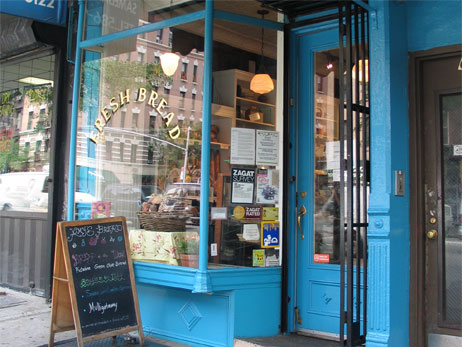What is it like for women in the culinary industry? What issues affect women chefs? Why aren't there more women chefs as major players, where are they going?
These are some of the questions I have posed to some women chefs in the industry today. Instead of a compilation, this writer chose to let you hear the answers from one chef.
Amy Scherber from Amy's Bread in NYC, was kind enough to give me her take on women in the industry.

JD: When did you get involved and what was it like at that time?
AS: I first worked at Bouley in 1987. I was one of 2 women in the kitchen then. It was a guy's kitchen with lots of guy jokes, but everyone was serious about cooking, so I learned a lot. I did not know better, so I just laughed at the jokes.
JD: Sexual Harassment- did it happen to you, in any form, and how did you handle it? How do you suggest other should handle it?
AS: I did not think of it as harassment. There was a lot of flirting, and more joking, but it never seemed like harassment. I have had people report harassment in my own bakery, and I always meet directly with the one harassing, within one or two days, to discuss the gravity of the situation. We have always been able to resolve it, as soon as the perpetrator finds out that it bothers someone else. The harasser has always been a man, and the target always a woman. But when I first started in the kitchen, I did not feel I was being harassed. For anyone, report it right away to the top manager of your workplace.
JD: East Coast or West Coast? Which is more woman friendly?
AS: I have always found far more women in the kitchen in California, Seattle, and Boston. It seems that in general, the West Coast is more women friendly. New York's kitchen culture came from the European tradition where women did not work in the kitchen.
JD: Should you get out of the kitchen, what would be that reason?
AS: Many women who work in my kitchen find that the work is too hard for the amount of pay they receive. They feel they can earn more using their brains and not their backs, so they move on. Men don't always see it that way. They just keep working and don't question it.
Women may want to have children and find it hard to balance a chef's schedule with that of a young child. I would not leave this industry, but as a business owner, I am more able to set my own schedule. Now I work weekdays and leave by 7 PM. I have a young child and I like to spend mornings, evenings, and weekends with him. I had him after my business had been open for 12 years, so I was very well established by then. I had worked late nights for 12 years and was happy to take a break from it!
JD: Career and Family. Is both really possible?
AS: If you own the business or are at the top, then yes. But it is always a struggle. But many women chefs I know have had a child or two by now. It is better to do the career for at least 10 years to become established and make a name--and to save money, before you start a family.

JD: What are your hours like?
AS: If I wanted to reach the top, what would I have to do or give up? For many years you give up a social life and sleep, but eventually you can get them back. It takes 10 to 15 years in the industry to earn the right to cut back your hours. I worked a lot of hours from 1987 to 2004, and finally cut back to 45 hours per week with nights and weekends off after that.
JD: If you were not in the kitchen, what else would you do?
AS: I would still want to work around food and people in some capacity. I am not sure doing what though.
JD: Even as a woman, do you find yourself discriminating against other women? Why? Why not?
AS: Sometimes the women applicants don't seem as serious as men as far as staying a long time, but usually, when there is a choice between two equal candidates, I always hire a woman. We need more women in this industry and too few apply.
AS: There are not enough women chefs around. They just leave the kitchen after a while and switch to something else. It is too bad. You have to be hard headed to make it!